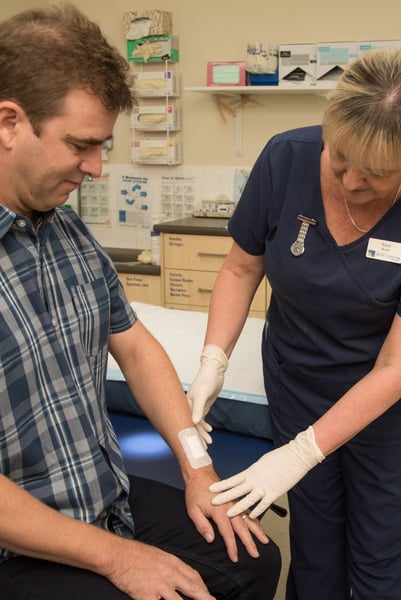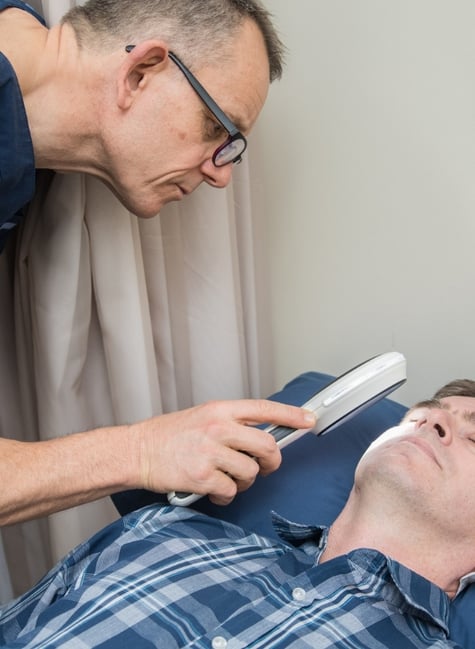Moles are small spots on your skin. Almost everyone has them, and most are harmless. But some...
_page1_image9-jpg-3.jpeg?height=200&name=ABCDEFG%20melanoma%20guide__Al%20Nour%20(2)_page1_image9-jpg-3.jpeg)
Most skin cancers can be completely cured if detected early.

We go above and beyond to ensure your skin health needs are met with expert diagnosis and treatment. Most skin cancers can be completely cured if detected early.
Skin cancer diagnosis is performed by the qualified and experienced doctors at National Skin Cancer Centres using the latest tools including dermoscopy and total body photography (in select centres).
In most cases, your doctor will take a biopsy of a suspicious lesion during your skin cancer check. This tissue sample is sent to a pathology laboratory for diagnosis, which may take several days. Our team will notify you with the results of your biopsy and an appointment will be made for you to receive treatment if required.
Your doctor will explain the recommended treatment, including preparations, aftercare, and what you can expect from the procedure. The majority of skin cancers can be treated in our purpose-built facilities.
Your doctor will discuss the appropriate skin cancer treatment according to your diagnosis. The treatment you receive will depend on multiple factors:

The doctors at National Skin Cancer Centres strive to deliver prompt, efficient and effective skin cancer treatments that minimise scarring. The majority of skin cancers can be treated in our purpose-built facilities. In rare cases, you may be referred for treatment at a hospital.
3. Curettage: The doctor removes the skin cancer by scraping it with a sharp instrument and burning the tissue to eliminate cancer cell remnants. This is often used to treat superficial cancers confined to the top layer of skin.
4. Topical treatments: This involves the application of creams that stimulate the immune system and promote your own body to destroy the cancer naturally.
If your skin cancer is at an advanced stage or has spread to other organs, you will be assisted with an onward referral to undergo radiotherapy or chemotherapy. Don’t worry – if detected early, this is a highly unlikely outcome.
Doctors' expertise working in combination with the latest diagnostic technology including dermoscopy, for the earliest and most accurate skin cancer diagnosis - improving outcomes for you.
When detected early, most skin cancers can be completely cured with a one-time treatment, avoiding complex and costly procedures in the future. Minimise scarring and disfigurement with non-surgical treatment options and early-intervention surgical procedures.
Benefit from the latest technology and tools in skin cancer detection and treatment, including purpose-built operating theatres and dedicated nursing support for your post-treatment aftercare.
Your doctor will recommend a skin cancer treatment based on the type of skin cancer you have, its stage, and its location on your body. Different skin cancer treatments are suitable for different circumstances.
Skin checks and procedures are not performed at the same time to minimise the risk of infection and help reduce your waiting time.
Post-treatment recovery time varies depending on the type of skin cancer, the area of the body, and the complexity of the procedure. Your doctor will give you appropriate advice before your skin cancer treatment so you will be prepared.
During your skin cancer check, the doctor will ask you to undress down to your underwear. You can ask for a modesty sheet if you wish. The doctor will use a dermatoscope to visually inspect your whole body. A dermatoscope is a special skin microscope which allows the doctor to look through your skin. The skin check process is completely painless. If you have an area of concern beneath your underwear, please let the doctor know.
If your skin cancer is at an advanced stage or has spread to other organs, you will be assisted with an onward referral to undergo radiotherapy or chemotherapy. Don’t worry – if detected early, this is a highly unlikely outcome.
The doctors at National Skin Cancer Centres are supported by a dedicated team of nursing staff to help manage your post-treatment aftercare. You may need to see us for a follow-up appointment to dress your wounds, remove stitches, or check on the progress or efficacy of your skin cancer treatment.
If you have been treated for skin cancer, you may be at high risk of the disease and the doctor may recommend more regular follow-up skin cancer checks.
Medical and cosmetic skin concerns addressed by certified practitioners.
Expert consultations and safe treatments delivered in a medical facility.
Comprehensive approach to overall skin health and personalised treatments.
Patient-centred focus to achieve healthy, beautiful skin for life.
